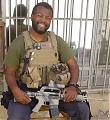If the concept could actually work in the real world, then I would agree that it would be cheaper to “buy out the insurgency.” It would appear that this tactic could be viable if the weapons supply were truly a closed system. I strongly suspect that paying top dollar would encourage entrepreneurs to import more weapons into the market thus creating a virtually unlimited supply.






 :
:



Bookmarks